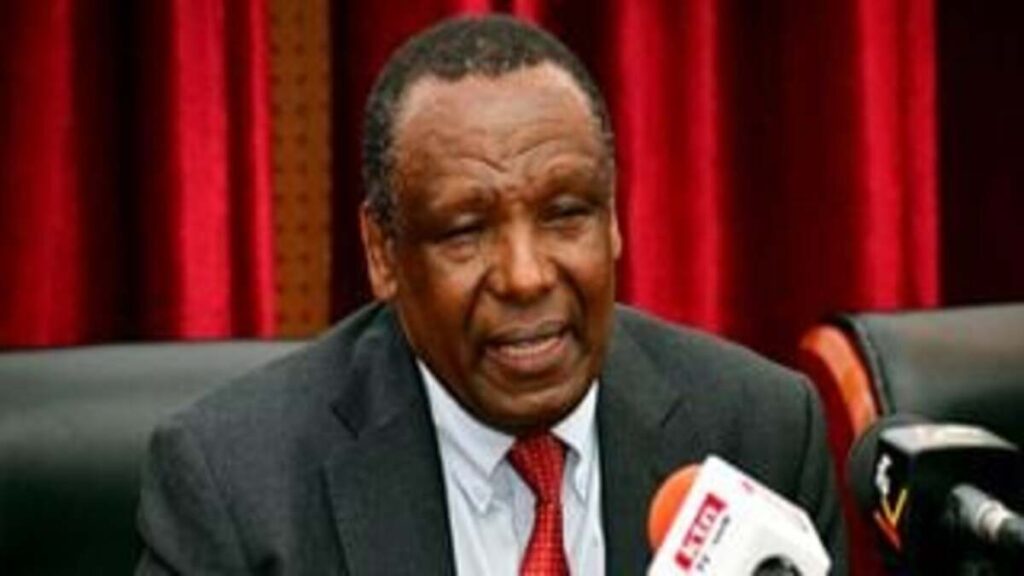Public universities in Kenya found themselves in an embarrassing situation yesterday after hastily retracting a return-to-work ultimatum issued to striking lecturers, deepening the crisis in higher education.
The Inter-Public Universities Councils’ Consultative Forum (IPUCCF), the body representing public universities’ management, had initially demanded that lecturers resume their duties immediately, accusing them of violating previous agreements.
However, in a dramatic turn of events, the forum withdrew the notice within hours, leaving both students and faculty in confusion about the next steps in resolving the ongoing dispute.

Inter-Public Universities Councils’ Consultative Forum Secretary Prof Daniel Mugendi. Photo credit: Francis Nderitu | Nation Media Group
The University Academic Staff Union (UASU), representing the striking lecturers, remained defiant despite the initial ultimatum. The union has maintained its position that they will not return to lecture halls until their demands for improved pay and working conditions are met.
“Our members will continue with the industrial action until the government honours its commitments,” said a UASU official. The union argues that previous agreements regarding salary increments have been consistently ignored by university management and government authorities.
The current strike has severely disrupted learning activities across Kenya’s public universities, affecting thousands of students who are increasingly concerned about completing their academic programmes on schedule.
Students have expressed frustration over the continuing impasse. Many worry about the impact of prolonged industrial action on their studies and future career prospects. “We’re being wasted,” lamented one student, echoing the sentiments of many others caught in the crossfire of the dispute.
The Parliamentary Committee on Education has stepped in to mediate the crisis. The committee has summoned UASU officials to appear before them in an attempt to find a lasting solution to the recurring problem of industrial action in public universities.
At the heart of the dispute lies the implementation of a return-to-work formula agreed upon in previous negotiations. The lecturers claim that the government has failed to honour its part of the agreement, particularly concerning salary increments and improved working conditions.
The situation has highlighted the deeper challenges facing Kenya’s higher education sector. Universities are grappling with funding constraints while trying to maintain quality education and satisfy the demands of their academic staff.
UASU issued a seven-day strike notice earlier this month after what they described as the government’s failure to implement previously agreed-upon terms. The union’s leadership has emphasised that their industrial action is legally protected and follows multiple attempts to resolve the issues through dialogue.
The retraction of the return-to-work notice by IPUCCF has raised questions about coordination and decision-making processes within university management structures. Education experts suggest that such inconsistencies could further erode trust between the parties.
Meanwhile, the Ministry of Education has remained relatively quiet on the matter, leading to calls for more direct government intervention in resolving the crisis.
The impact of the strike extends beyond the classroom. Research projects, student supervision, and other academic activities have ground to a halt, potentially affecting the universities’ academic calendar and graduation schedules.
Some universities have reported that postgraduate programmes are particularly affected, as supervision and research activities have been suspended during the strike period.
The Parliamentary Committee on Education is expected to hold meetings with both UASU and university management representatives in the coming days. Stakeholders hope these discussions will lead to a breakthrough in the deadlock.
Education analysts note that the frequent strikes in public universities have become a recurring challenge that requires long-term solutions rather than temporary fixes.
“The cycle of strikes, negotiations, and broken promises needs to end,” commented an education expert. “We need sustainable solutions that address both the financial constraints of universities and the welfare of academic staff.”
As the situation continues to evolve, students remain the most affected, with many calling for swift resolution to allow them to resume their studies. Some have suggested the need for compensation through extended learning periods to make up for lost time.
The coming weeks will be crucial in determining whether a resolution can be reached to end the strike and restore normalcy to Kenya’s public universities. Both parties are under increasing pressure to find common ground and prevent further disruption to the academic calendar.